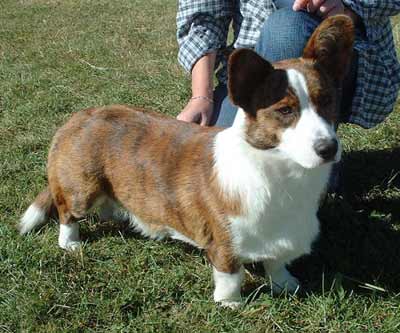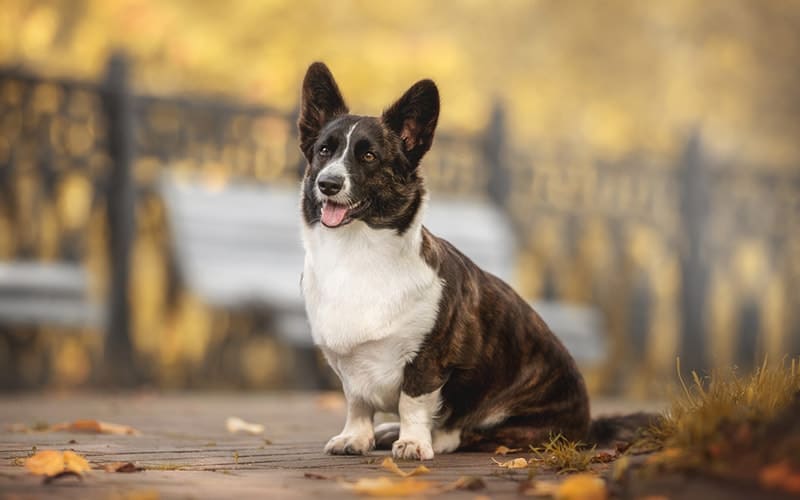
The Cardigan Welsh Corgi is one of the oldest of the herding dog breeds!
The Cardigan Welsh Corgi is a herding dog recognized by its long body followed by a long tail, and its short legs. It is one of two Welsh Corgi breeds developed in Wales beginning around 1200 B.C. The other Corgi is its southern cousin, the Pembroke Welsh Corgi. These two were only recognized as separate breeds about 70 years ago, but the Cardigan Corgi is said to be the older of the two.
Cardis are beloved for their loyalty and obedience and can be a hard-working companion.They are very protective of their families and make excellent guard dogs. They do have a tendency to be suspicious of strangers and are not a good choice for very young children. However if well socialized when a puppy, they can be fine with children that are older and more pet savvy. Cardigans aim to please, so they are usually easy to train.
When choosing a Cardigan Welsh Corgi, check bloodlines for hip dysplasia and eye problems such as partial pupillary membranes and glaucoma. Arthritis and spinal problems are also common in the breed, especially in aging or overweight dogs. Degenerative myelopathy, a devastating chronic disease that can result in loss of sensation and paralysis, is also a potential problem with this breed.
- Kingdom: Animalia
- Phylum: Chordata
- Class: Mammalia
- Order: Carnivora
- Family: Canidae
- Genus: Canis
- Species: lupus familiaris
Common Name(s)
Cardigan Welsh Corgi, Corgi, Welsh Corgi, Cardigan Corgi, and Cardi
Breed Type
The Cardigan Welsh Corgi is a herding dog. One of the oldest herding breeds, the Cardigan is a loyal and hard-working companion.
Background
Corgis originated in Wales, probably over 3,000 years ago. The short-legged breed has been used for centuries as a cattle herder. Its unique build allows it to duck or roll out of the way quickly if it is in danger of being kicked. Today, however, the Cardigan is most often a family pet.
The Cardigan Welsh Corgi is one of two varieties of Corgi. The closely related Pembroke Welsh Corgi has a similar look, but its tail is much shorter. These two Corgi breeds weren’t officially considered separate, however, until about 70 years ago.
Description
Cardigan Welsh Corgis are recognizable by their long bodies and tails and short legs. Their heads are broad and flat, with large, upright ears. Eye color varies according to coat color, but should not be blue unless the coat is blue merle. Other coat colors include brindle, black, black and tan, black and brindle, sable, and red. The coat is of medium length and coarse with a soft undercoat.
Cardigans should be 36 to 43 inches long from nose to tip of tail. Both males and females are 10 to 13 inches tall and weigh 25 to 30 pounds.
Care and Feeding
The Corgi does well on a diet that includes fish, beef, rye, oats and corn. Cardigan Welsh Corgis are very easy to groom. Regular combing and brushing and as-needed baths are sufficient. Dewclaws should be removed from Cardis as puppies.
Cardigan Welsh Corgis need yearly checkups to ensure good health. Vaccinations are due as follows:
- 6-8 weeks: Distemper, Leptospirosis, Hepatitis, Parainfluenza, Parvo, and Corona virus (DHLPPC)
- 10-12 weeks: Second DHLPPC
- 14-16 weeks: Third DHLPPC and rabies
- Annually: DHLPPC and rabies booster
Corgis shed twice a year. Regular vacuuming is a must during these times.
Housing Your Dog
Cardigans are very active dogs, so they need ample space to run and play in. They may live indoors in small spaces as long as they have regular access to the outdoors.
Social Behaviors
Cardigans are usually suspicious of strangers, so obedience training is important. While not an ideal choice for young children, they can be good companions for older, well-behaved ones. They do well with non-canine pets and other Corgis, but often fight with dogs of other breeds. Males are often aggressive toward other males. Problems can be minimized with good socialization during puppyhood.
Handling and Training
Cardis are smart and eager to please, making training relatively easy. Obedience training is essential to prevent heel nipping and other unwanted behaviors.
Activities
Cardigan Welsh Corgis need long daily walks and regular play sessions. The Corgi is a working dog by nature, so if you can provide some sort of work for it to do (such as herding), it will be more likely to be content.
Breeding/Reproduction
When selecting a mate for your Cardigan Welsh Corgi, check bloodlines for hip dysplasia and eye problems.
Common Health Problems
The Cardigan’s unique anatomy predisposes it to spinal problems and arthritis. The risk of these ailments may be minimized by carefully watching the dog’s weight, as they are more common in overweight animals. Other common problems in the breed include hip dysplasia, Von Willebrand’s disease, and several eye disorders.
Degenerative myelopathy is an incurable disease that some Corgis suffer from. Treatments such as hydrotherapy and certain drugs can help slow its progress and improve the dog’s quality of life.
Availability
Cardigan Welsh Corgis are hard to find in many areas, but breeders may be located online. Prices are usually between $700 and $1,000.
References
“Cardigan Welsh Corgi“, Dog Breed Info Center, Copyright 1998-2008
Cusick, William D., “What to Feed a Cardigan Welsh Corgi“, Referenced online, 2008
“Cardigan Welsh Corgi Puppies for Sale“, Copyright PuppyFind.com, LLC, Referenced online, 2008
“Cardigan Welsh Corgi“, Wikipedia, Copyright 2008
“Canine Degenerative Myelopathy“, Wikipedia, Copyright 2008
Featured Image Credit: Liudmila Bohush, Shutterstock
